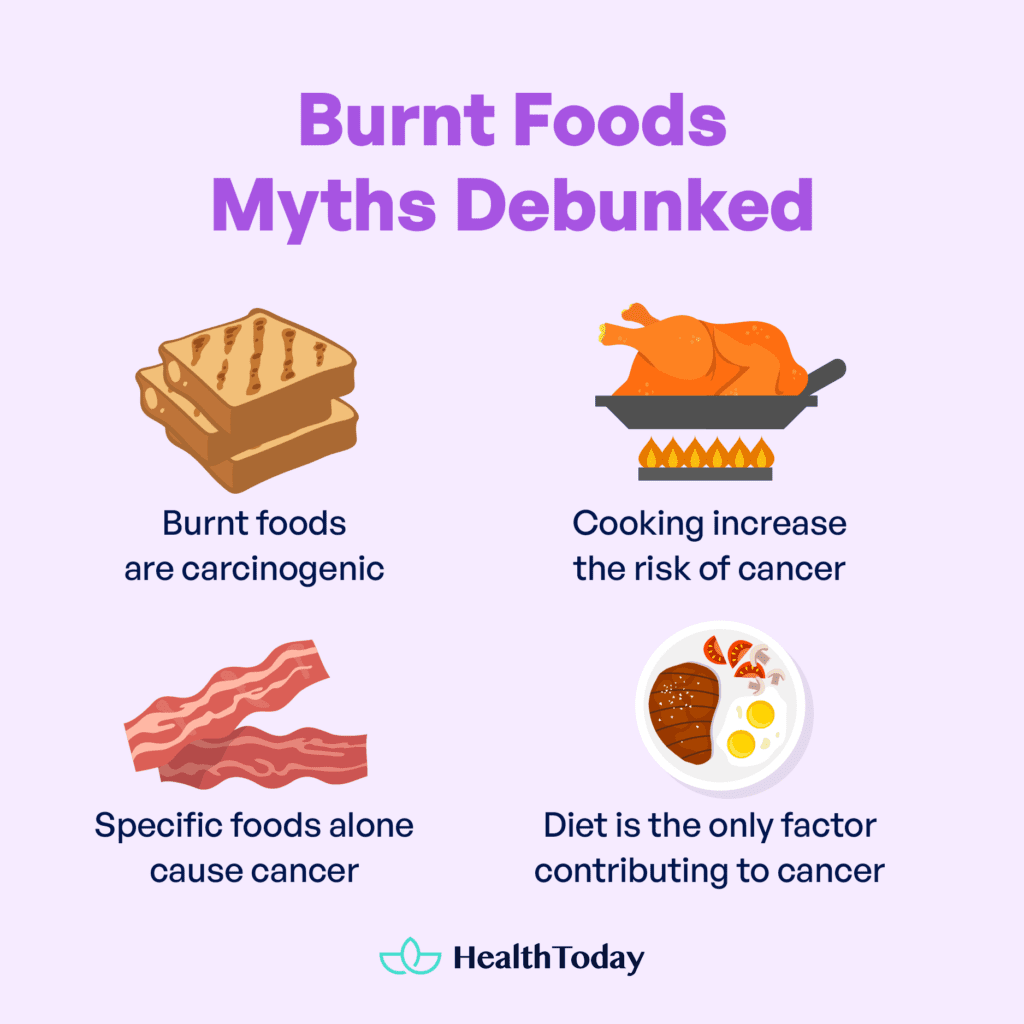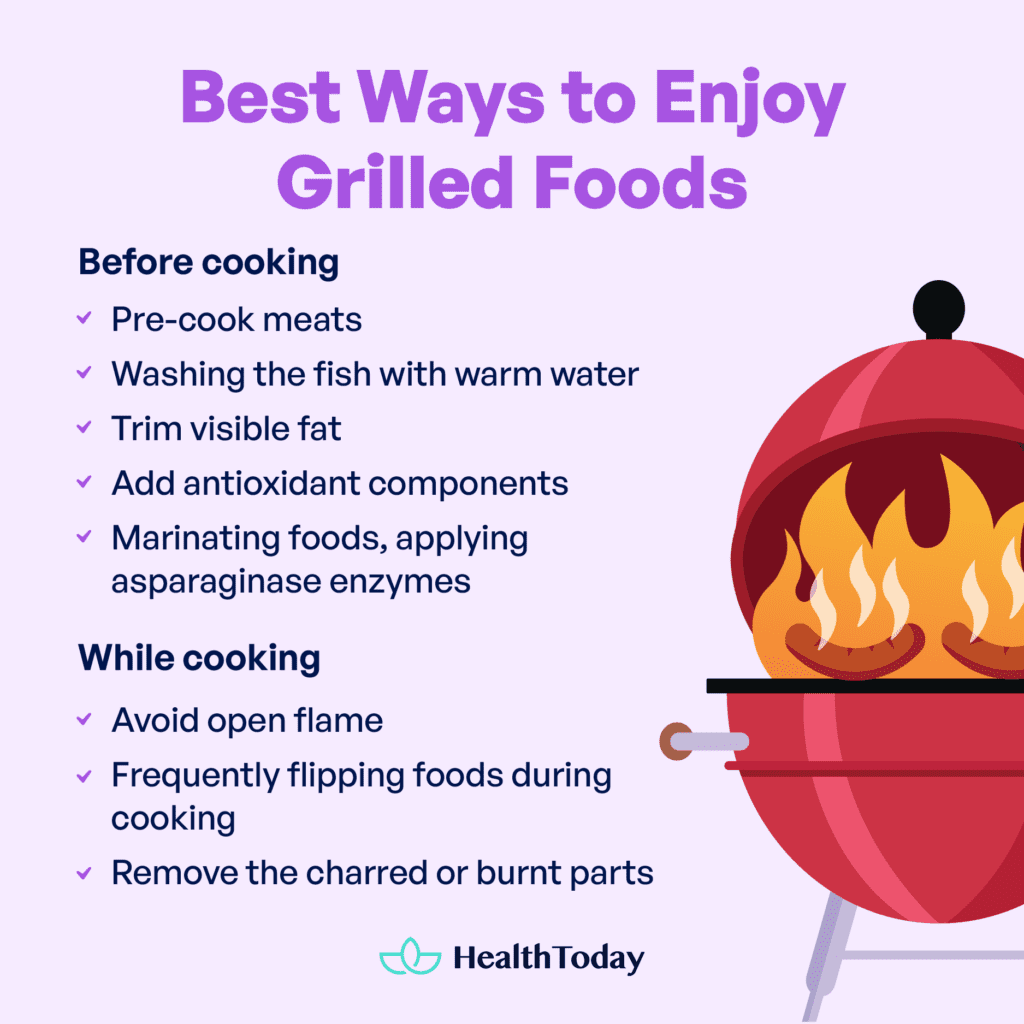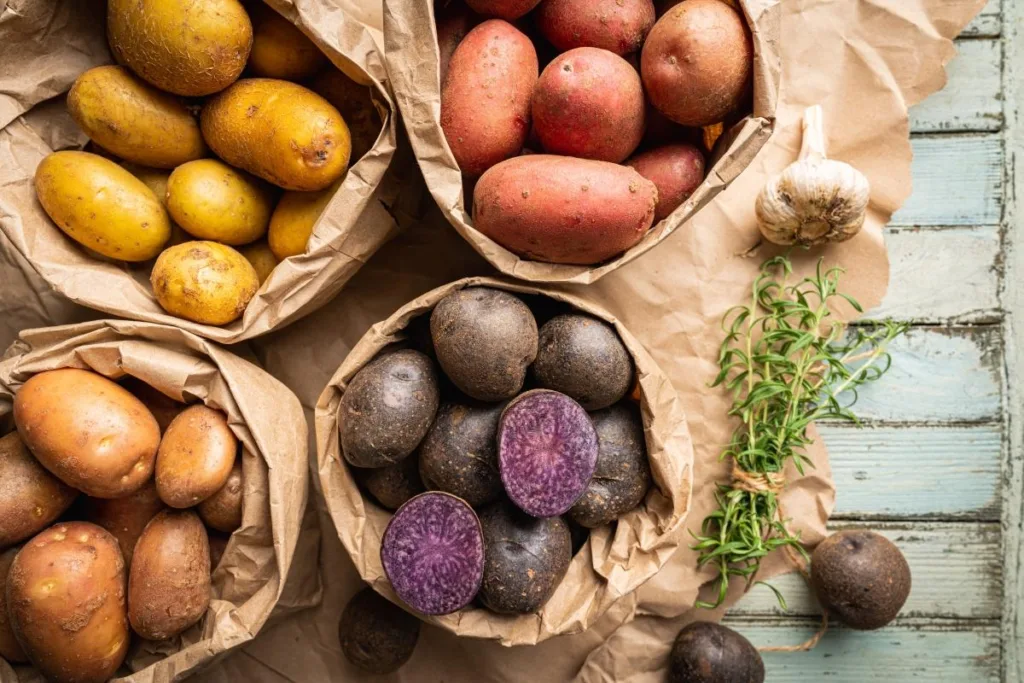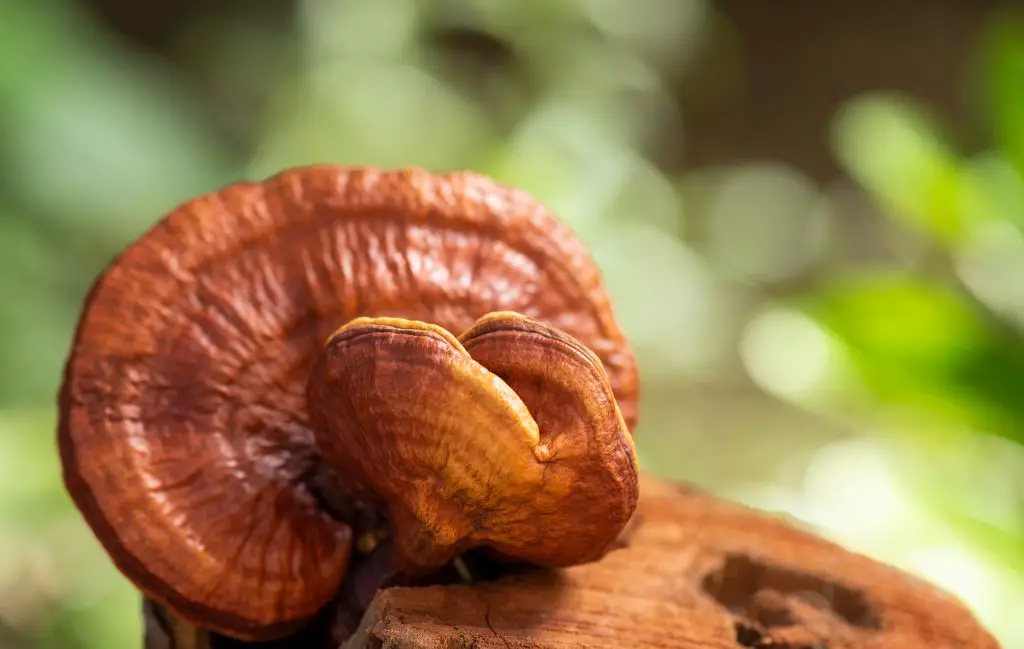Table of Contents
Burnt food is a topic that often sparks curiosity and concern. From the charred edges of burnt toast to the aroma of slightly burnt popcorn, many wonder about the potential relation to health implications. Rumors go along with questions such as “Does burnt food cause cancer?” and “Is burnt food bad for you?” have been widespread.
In this exploration, we will uncover the myths and risks of burnt food and share some tips to minimize the effects.
Is eating burnt food bad for you? Facts you should know
Is it bad to eat burnt food? This question has been a subject of concern for many people who enjoy grilled, roasted, or fried foods. The charred and crispy texture of burnt foods can appeal to some. But, it also raises some health-related questions.
The Maillard reaction: Secret of burnt food
Before discussing the impact of eating burnt foods, it’s crucial to understand the process by which they’re created. Burnt foods are products of a chemical reaction known as the Maillard reaction. The reaction occurs when high heat – above 120°C – is applied to foods rich in carbs and proteins (1). It leads to browning and the formation of new flavors and aromas (1).
The substance formed during the Maillard reaction is called acrylamide. It results from a sugar-content reaction with the amino acid asparagine (2). Both are naturally present in a lot of foods.
The amount of acrylamide found in foods is influenced by some factors. These include the cooking temperature and duration, moisture content, and the amount of sugars and asparagine in the raw ingredients (3, 4, 5).
Does burnt food cause cancer?
The Maillard reaction is responsible for many dishes’ alluring flavors and appearance. However, it also produces some compounds that are often linked to cancer risk.
Acrylamide is one of those compounds. It’s classified as probably carcinogenic to humans by the International Agency for Research on Cancer (IARC) (6). As of today, there’s no conclusive evidence supporting a definitive link between acrylamide and cancer risk.
Although some studies suggest a potential association in certain types of cancer (7, 8, 9), others found no relation between them (10, 11, 12, 13). The strongest link is in lab studies (in vitro), indicating that the observed relation was mainly noted in controlled environments. However, the evidence for human cancers is limited.
Two other compounds in burnt foods are heterocyclic amines (HCAs) and polycyclic aromatic hydrocarbons (PAHs). Both have been classified as potentially carcinogenic (14, 15). They’re usually found in animal products, including beef, pork, fish, and poultry, cooked in high heat (16).
Researchers show that a diet high in well-done, fried, or barbecued meats, which contain HCA and PAH, is linked to higher risks of some cancers, such as colorectal cancer (17, 18, 19). However, some other studies found no link between them (20, 21).
So, can eating burnt food cause cancer? To date, evidence suggests that eating burnt food is unlikely to significantly increase the risk of cancer. It’s not essential to avoid slightly burnt food. But, it’s always better to maintain a well-balanced diet to minimize any potential cancer risk.
The Maillard reaction adds flavors but produces compounds like acrylamide, HCAs, and PAHs. These compounds are possibly carcinogenic in high-level intake. However, the scientific evidence is inconclusive. Slightly burnt food is unlikely to pose significant risks, but a balanced diet minimizes potential cancer risks.
Is burnt food carcinogenic?
Through specific cooking methods, some chemical reactions might be triggered. This results in the formation of potentially harmful compounds in burnt foods. But the question remains: Is it necessary to completely eliminate fried, grilled, or roasted foods from your daily meal?
Is it bad to eat burnt toast?
Just as with other burnt foods, the browning or charring characteristic of burnt bread results from acrylamide formation during the toasting process. Due to its presence, burnt toast has been a subject of concern regarding its potential to cause cancer. However, the evidence in human studies remains inconclusive.
The key to addressing the potential risks related to burnt toast lies in moderation and prudent toasting practices. Consuming burned toast occasionally is unlikely to have a significant impact on health (22).
However, avoiding excessive charring or over-toasting is advised to minimize the formation of acrylamide and other potentially harmful compounds. Additionally, incorporating a diverse diet, focusing on fresh, minimally processed foods, can mitigate potential health concerns.
Is eating burnt popcorn bad for you?
Burnt popcorn is characterized by its charred appearance and distinct, smoky aroma. Popcorn enthusiasts often question the impact of burnt popcorn on health. This is due to the presence of acrylamide in it. But, its carcinogenic effect in humans is not yet confirmed.
Despite potential risks, occasionally enjoying popcorn in its slightly burnt form will not pose immediate health threats. However, to minimize exposure to potentially harmful compounds, it’s advisable to avoid excessive overcooking of popcorn. Including various fresh fruits, vegetables, and other wholesome snacks in your diet is also recommended, as it can contribute to overall well-being.
The burnt foods myths debunked
The belief that burnt foods can significantly increase cancer risk has been a longstanding myth. It’s essential to separate genuine risks from common misconceptions to make informed decisions in dietary choices.

Burnt foods are carcinogenic
One prevalent myth is that consuming burnt foods inevitably leads to cancer. This belief stems from the formation of potentially harmful compounds when foods are exposed to high heat. The highlighted carcinogenic compound is acrylamide.
In fact, the overall risk from occasional consumption of slightly burnt food is relatively low. According to the European Food Standard Agency (EFSA), adults are typically exposed to acrylamide for around 0.56 – 1.1 µg/kg body weight per day (22). Meanwhile, acrylamide exposure for 170 µg/kg body weight per day is unlikely to cause tumors in mice (22).
So, how much burnt food causes cancer? The answer remains unclear. However, adults could consume up to 160 times more acrylamide without reaching a level that would cause higher tumor risk in mice (23).
Cooking increases the risk of cancer
Although some cooking methods might form an amount of potentially harmful components, it doesn’t mean you shouldn’t cook your foods. The truth lies in moderation and prudent cooking practices.
It’s crucial to avoid excessive exposure to high temperatures and opt for gentler cooking methods like steaming or boiling instead (24). These cooking methods help preserve the nutritional content of the food while lowering exposure to harmful compounds (24, 25).
Specific foods cause cancer
Another common misconception is that certain foods, including burnt foods, are solely responsible for causing cancer. In reality, cancer development is a complex interplay of multiple factors. These factors include genetic predisposition, lifestyle choices, environmental exposures, and overall dietary patterns (26).
A well-rounded diet that includes a variety of fresh fruits, vegetables, lean proteins, and healthy fats is crucial in reducing cancer risk (27). Focusing on the overall dietary pattern rather than reducing specific foods will promote better health and help prevent cancer.
Diet is the only factor contributing to cancer
Some myths suggest that dietary choices alone determine cancer risk. In fact, a holistic approach to cancer prevention considers all aspects of lifestyle and environmental factors (26). Besides having a balanced diet, there are some ways to lower cancer risk. These include regular physical activity, avoiding smoking and excessive alcohol consumption, and reducing exposure to environmental carcinogens (26).
Best ways to enjoy grilled foods

Despite having possible harmful compounds, there are actually things we can do to minimize the potential risk of burnt foods. Cooking and preparation methods can significantly impact them. Here are some tips for you to enjoy your meals without worrying too much about the harmful aspects:
- Pre-cooking meats in boiling water or microwave briefly before grilling or roasting. This can lower HCAs, PAHs, and acrylamide formation in the cooking process by reducing the cooking time (28).
- Adding some antioxidant components like green tea extract in the food preparation process can reduce acrylamide formation (29, 30).
- Marinating foods in certain solutions or marinades, applying asparaginase enzymes, and frequently flipping foods during cooking (31, 32, 33).
- Trim visible fat from meats before cooking. Fats may contribute to increased HCA and PAH development as their distribution depends on the fats (34).
- Prevent direct exposure of foods to an open flame or a hot metal surface to help reduce HCA and PAH development (28).
- Removing the charred or burnt part of the foods can help significantly reduce possible harmful compounds exposure (28).
For seafood, especially fish, try washing the fish with warm water. This process will help lower the PAHs content in it (35).
Is burnt bread bad for you?
Eating it occasionally will unlikely cause any negative health effects. But, just like any other burnt food, consuming it excessively can be risky. This is due to the presence of compounds like acrylamide, a potential carcinogen.
Do potato chips cause cancer?
The formation of acrylamide in potato chips and other fried foods can be a concern, as it is a potential carcinogen. While there isn’t any conclusive evidence linking acrylamide with cancer in humans, it’s still recommended not to consume it in large amounts.
Is burnt food bad for your stomach?
Eating burnt food occasionally won’t likely affect our stomach. However, it may harm the stomach when consumed excessively. Burnt food might change the gut’s microbes, causing cell growth and affecting the colon’s protective layer, possibly leading to cancer. It’s essential to practice moderation to maintain a healthy stomach and overall well-being.
Does burnt food have toxins?
Yes, burnt food can contain toxins. When food is cooked at high temperatures, potentially harmful compounds, namely acrylamide, heterocyclic amines (HCAs), and polycyclic aromatic hydrocarbons (PAHs), can form. They are potential carcinogens.
Is it OK to eat slightly burnt food?
Yes! Eating slightly burnt food occasionally is generally considered safe for most people. Its risk of harmful effects is relatively low, as the levels of the harmful compounds are minimal and aren’t likely to pose immediate health risks.
Is burnt food easier to digest?
No, burnt food isn’t generally easier to digest. It can be more challenging for the digestive system to process it. When food is overcooked, it can be dry and tough,
which can make it harder to be broken down and extracted efficiently.
Summary
Burnt foods contain several compounds that might be harmful. These include acrylamide, HCAs, and PAHs. Despite all the myths and risks about burnt food, there is no conclusive evidence to support the claim that consuming burnt toast, popcorn, or other charred foods directly causes cancer. However, it’s advisable to avoid excessive charring to minimize any potential harm, as the key lies in cooking with moderation.

















Comments
0